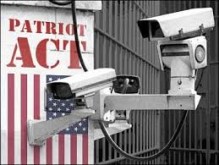“We are not the country we say we are. What we are arguing about is the distance between the two.”
In the June 2002 issue of Archipelago, I published an important speech by then-Sen. Russell Feingold (D-Wis), the only United States senator to have voted against the USA PATRIOT Act. This speech is still timely, even as the recent leaks about the extent of NSA intercepts of metadata (and who knows what else, or how they’ve been doing it?) seem to have come as a huge surprise to so many people who should have been aware that we had long since become the National Security State. Even the usual pundits seem taken aback, as they scramble to accommodate to what they sort of knew, sort of didn’t know, and don’t really understand, because not many of us really comprehend how much we are, all of us, enmeshed systemmatically in Big Data.
Does NSA know more about any of us than Google does? Than Facebook? What are they going to do with all those data? The political blogger Charles Pierce cuts to the chase, or one of the chases — because there are parallel runs on this matter of collecting information about citizens/customers/suspects — by circling back around:
“First of all, it’s past time to re-examine everything that was done in such a panic after 9/11. Daniel Patrick Moynihan was warning us about the NSA and secrecy three decades ago. Jim Bamford has made his living writing about the NSA. These problems are not new. This re-evaluation especially includes the Patriot Act, which keeps getting renewed by a Congress which long ago abdicated its oversight role in intelligence as thoroughly as it has abdicated its War Powers. . . .
“Fear is the new normal. I lived through the Church Committee hearings. That was the last time the secret state-within-a-state was revealed to this extent, and that was by an empowered congressional committee. Business as usual opened again in 1980. We are not the country we say we are. What we are arguing about is the distance between the two.”
